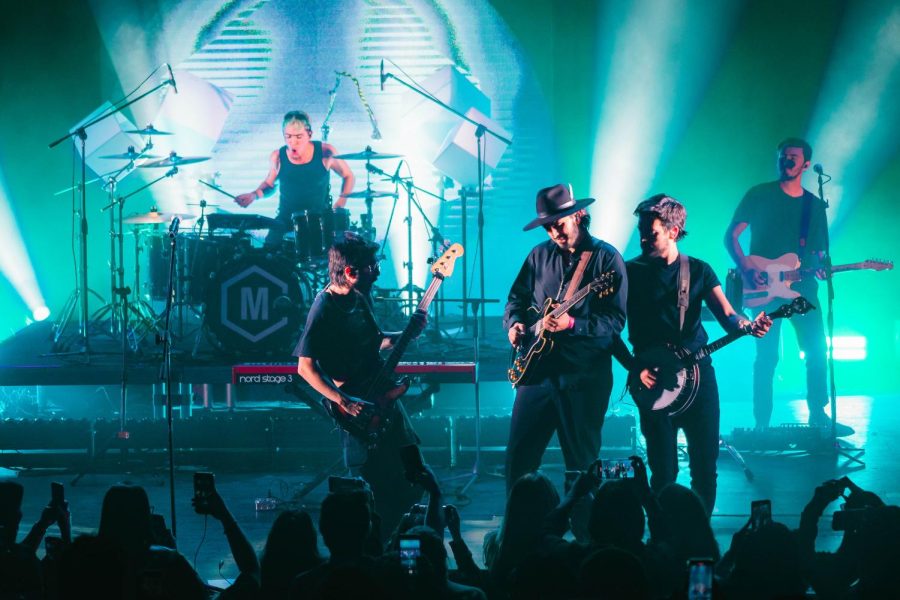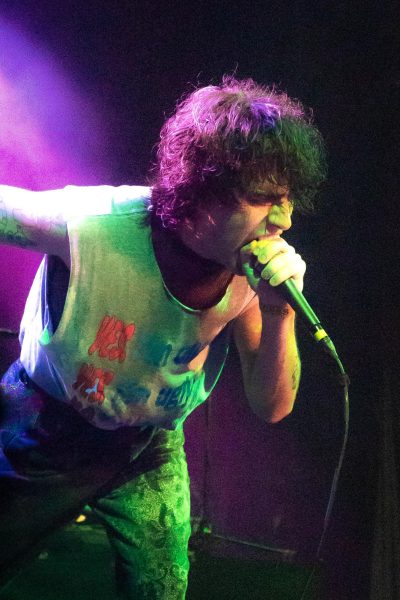‘Si ayer fuera hoy’
An interview and concert recap with Spanish-speaking band Morat
February 7, 2023
Disclaimer: Morat was interviewed by The Paisano in their native language. English translations will follow Spanish quotes in parenthesis.
“Musica de banda, de instrumentos,” (Band music with instruments), answered Juan Pablo Isaza after being asked how Morat would describe their sound to a new audience. This is an answer that seems very simplistic, but after watching Morat perform on the stage, it fits perfectly.
While introducing their single “No Se Va,” (It Does Not Leave), the band played each instrumental layer of the song, one by one. During his monologue, Isaza stated why they are band music with instruments when introducing Simón’s bass, “tal vez no se escuche, pero se siente” (It might not be heard, but it can be felt). The band would go on to share the stage with Grupo Frontera, who covered a norteño version of their song in spring 2022, which would go viral and chart on the Billboard Hot 100.
The Colombian quartet is composed of lifelong friends Isaza and Juan Pablo Villamil, along with brothers Simón and Martín Vargas. In the reggaeton-saturated world of Latin music, Morat is a breath of much-needed fresh air. The band’s “SI AYER FUERA HOY” (IF YESTERDAY WAS TODAY), tour comes just in time for the release of their most recent album of the same name, with the lead singles such as “Llamada Perdida” (Missed Call), being released throughout 2022.
“Nosotros, creo, que nunca hemos sido una banda que quiera quedarse como algo constantemente,” (We have never been a band that likes to be the same constantly), Villamil said. The band opened with their hit song “Besos en Guerra” (Kisses in War), from their sophomore album “Balas Perdidas,” (Lost Bullets), but took a more rock approach, a genre that the band has gradually leaned into throughout the years and would like to continue to explore.
“Yo creo que para, uno de [hacer esto de carrera] hay que ser bastante sensible,” (I think that [to do this as a career] one must be pretty sensitive), Isaza explained. He shared that composing their music is not necessarily about their own experiences but about being able to be empathetic towards others and “exagerar incluso muchas veces para salir con frases bonitas,” (exaggerate many times to produce pretty phrases), an art they mastered in the song “Debi Suponerlo,” (I Should Have Known), which elicited an outstanding emotional reaction from the audience.
Morat’s popularity can not only be credited to their songwriting but the emotion they put into it, which is clear while they are on stage. They have proven to be great songwriters, but they are also very charismatic performers. Simón, for example, is the most fun to watch as he moves and grooves with every song. He never stands still and keeps an extremely consistent energy from beginning to end. On the other side is Villamil, whose moves might not be very telling, but his eyes are. There is a lot of gentle but strong passion in his eyes that allows the audience to feel what he feels. Isaza’s strong performance point is his voice. The emotions are all well-channeled through his vocals, especially with his resonating note at the end of “Yo No Merezco Volver” (I Do Not Deserve to Come Back). Finally, the drummer Martín is an absolute spectacle, with his sunglasses, mint-colored hair and contagious energy that he emits from behind his drums, which shatters any barrier between him and their fans.
But this is not the best or the last of them the world will hear. “Nuestras canciones y al igual que a otros conceptos suele ser bastante recurrente,” (our songs and like other concepts it is very recurrent), Izasa shared, about the conjugation of the Spanish verb volver (to return). The use of the word “volver” allows them to return “a una mentalidad que muchas veces siento como si no hubiera pasado el tiempo,” (to a mentality that I have felt many times as if time has not passed), which he credits to allow them to be healthy and working.
As Isaza said, they are a band with instruments, a fact that can be felt physically, spiritually and emotionally. Watching Morat perform live is like watching a painter create their masterpiece — an unforgettable experience.
To watch or listen to the full interview with Morat, visit The Paisano’s YouTube or Spotify.













